新概念英语二:一般将来时巩固练习
- 格式:doc
- 大小:38.00 KB
- 文档页数:2
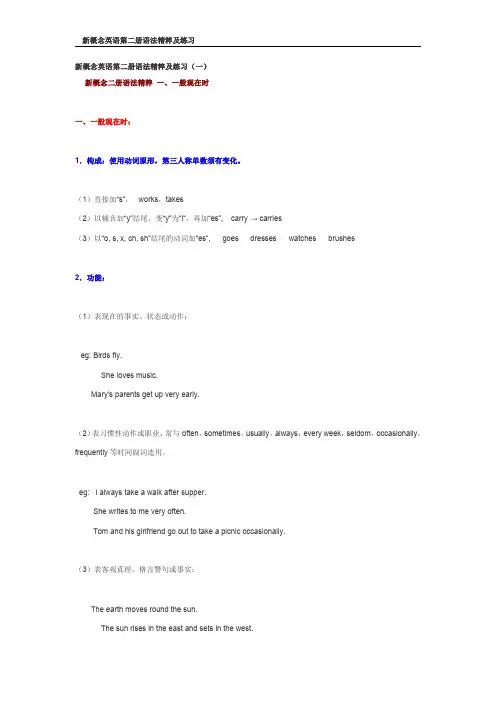
新概念英语第二册语法精粹及练习(一)新概念二册语法精粹一、一般现在时一、一般现在时:1.构成:使用动词原形,第三人称单数须有变化。
(1)直接加“s”,works,takes(2)以辅音加“y”结尾,变“y”为“i”,再加“es”,carry→carries(3)以“o,s,x,ch,sh”结尾的动词加“es”,goes dresses watches brushes2.功能:(1)表现在的事实、状态或动作:eg:Birds fly.She loves music.Mary's parents get up very early.(2)表习惯性动作或职业,常与often,sometimes,usually,always,every week,seldom,occasionally,frequently等时间副词连用。
eg:I always take a walk after supper.She writes to me very often.Tom and his girlfriend go out to take a picnic occasionally.(3)表客观真理,格言警句或事实:The earth moves round the sun.The sun rises in the east and sets in the west.Two and two makes four.No man but errs.人非圣贤,熟能无过。
(4)表将来:A.在由when,after,before,as,as soon as,although,because,if,even if,in case,till,until,unless,so long as,where,whatever,wherever等引导的状语从句中用一般现在时表将来发生的动作。
(黄金重点,所有考试都不放过它!)例如:I'll tell her when shecomes tomorrow.Even ifit rains this afternoon,I'll meet you.Whatever happens,you should keep cool-headed.(不错的句型,背下!!)I'll be right here waiting for you wherever you go.(很感人的句型!)B.按时间表示将要发生的动作或事件,用一般现在时表达将来时概念。
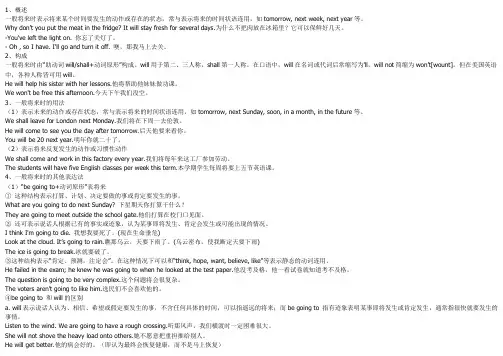
1、概述一般将来时表示将来某个时间要发生的动作或存在的状态,常与表示将来的时间状语连用,如tomorrow, next week, next year等。
Why don’t you put the meat in the fridge? It will stay fresh for several days.为什么不把肉放在冰箱里?它可以保鲜好几天。
-You've left the light on. 你忘了关灯了。
- Oh , so I have. I'll go and turn it off. 噢,那我马上去关。
2、构成一般将来时由“助动词will/shall+动词原形”构成。
will用于第二、三人称,shall第一人称。
在口语中,will在名词或代词后常缩写为'll,will not简缩为won’t[wount]。
但在美国英语中,各种人称皆可用will。
He will help his sister with her lessons.他将帮助他妹妹做功课。
We won't be free this afternoon.今天下午我们没空。
3、一般将来时的用法(1)表示未来的动作或存在状态,常与表示将来的时间状语连用,如tomorrow, next Sunday, soon, in a month, in the future等。
We shall leave for London next Monday.我们将在下周一去伦敦。
He will come to see you the day after tomorrow.后天他要来看你。
You will be 20 next year.明年你就二十了。
(2)表示将来反复发生的动作或习惯性动作We shall come and work in this factory every year.我们将每年来这工厂参加劳动。
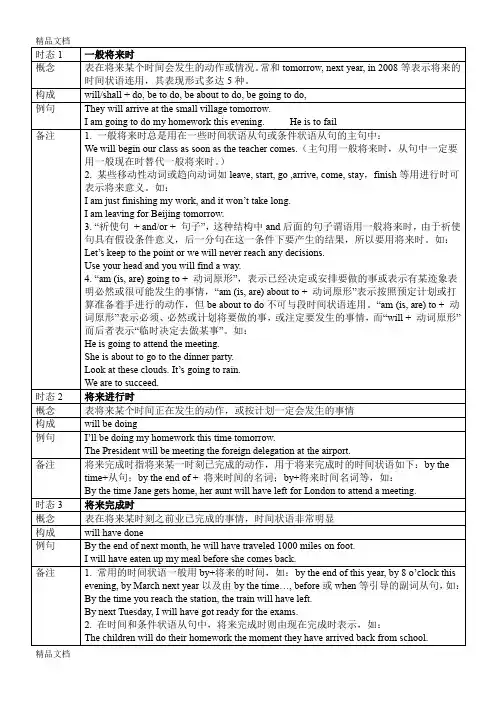
时态1 一般将来时概念表在将来某个时间会发生的动作或情况。
常和tomorrow, next year, in 2008等表示将来的时间状语连用,其表现形式多达5种。
构成will/shall + do, be to do, be about to do, be going to do,例句They will arrive at the small village tomorrow.I am going to do my homework this evening. He is to fail备注 1. 一般将来时总是用在一些时间状语从句或条件状语从句的主句中:We will begin our class as soon as the teacher comes.(主句用一般将来时,从句中一定要用一般现在时替代一般将来时。
)2. 某些移动性动词或趋向动词如leave, start, go ,arrive, come, stay,finish等用进行时可表示将来意义。
如:I am just finishing my work, and it won’t take lon g.I am leaving for Beijing tomorrow.3. “祈使句+ and/or + 句子”,这种结构中and后面的句子谓语用一般将来时,由于祈使句具有假设条件意义,后一分句在这一条件下要产生的结果,所以要用将来时。
如:Let’s keep to the point or we will never reach any decisions.Use your head and you will find a way.4. “am (is, are) going to + 动词原形”,表示已经决定或安排要做的事或表示有某迹象表明必然或很可能发生的事情,“am (is, are) about to + 动词原形”表示按照预定计划或打算准备着手进行的动作,但be about to do不可与段时间状语连用。
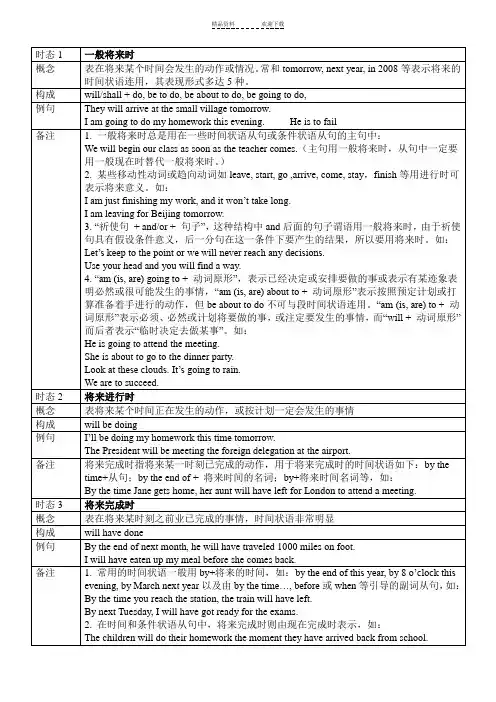
练习:一.单选题1. There __________ a meeting tomorrow afternoon.A. will be going toB. will going to beC. is going to beD. will go to be2. Charlie ________ here next month.A. isn’t workingB. doesn’t workingC. isn’t going to workingD. won’t work3. He ________ very busy this week, he ________ free next week.A. will be; isB. is; is /C. will be; will beD. is; will be4. There ________ a dolphin show in the zoo tomorrow evening.A. wasB. is going to haveC. will haveD. is going to be5. If it ________ tomorrow, we roller-skating.A. isn’t rain ,will goB. won’t rain , will goC. doesn’t rain,will goD. doesn’t fine ,go6.I won’t be able to attend the meeting tonight because____ then.A. I must have a classB. I will be teaching a classC. I teach a classD. I will have taught a class7. -----Could you give these books to Mr. Black?-----Absolutely, ___ him at five this afternoon.A. I will have a talk withB. I have a talk withC. I can have a talk withD. I will be having a talk with8. I’m afraid I won’t be available then. I ___ a friend at three this afternoon.A. seeB. am seeingC. will seeD. will be seeing9. Next Friday I to another concert. They ____ some thing by Mozart at that time.A.go, playB.will go , will be playingC. will go , are going to playD. are going ,are to play10. -----What are you doing, Jack?-----Make a model plane. I ____ it in the science class at 10 o’clock tomorrow morning.A. will be showingB. am going to showC. showD. have showed11. By the end of this year ,I ____enough money for a holiday.A will saveB will be savingC will have savedD have saved12. I have been studying here for four years,by next summer ____-.A shall graduateB shall be graduatedC shall be graduatingD shall have graduated13. I hope her health _______greatly by the time we come back next year.A improvesB improvedC will be improvedD will have improve14. “Are you going to Richard”s birthday party?…“Yes.By then I ______my homework..”A had finishedB will have finishedC would have finishedD finished15. I suppose by the time I come back in ten years‟ time all these old house______down.A will have been pulledB will be pullingC will have pulledD will be pulled二、翻译题1.当我明天早晨起床是,我妈妈将在为我准备早饭。
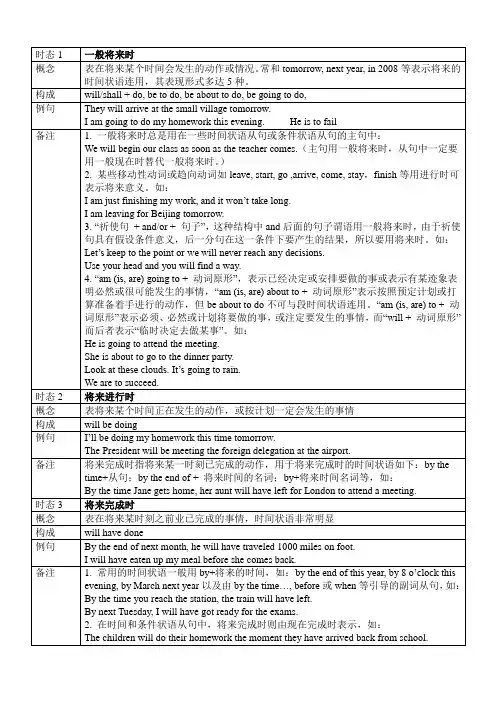
练习:一.单选题1. There __________ a meeting tomorrow afternoon.A. will be going toB. will going to beC. is going to beD. will go to be2. Charlie ________ here next month.A. isn’t workingB. doesn’t workingC. isn’t going to workingD. won’t work3. He ________ very busy this week, he ________ free next week.A. will be; isB. is; is /C. will be; will beD. is; will be4. There ________ a dolphin show in the zoo tomorrow evening.A. wasB. is going to haveC. will haveD. is going to be5. If it ________ tomorrow, we roller-skating.A. isn’t rain ,will goB. won’t rain , will goC. doesn’t rain,will goD. doesn’t fine ,go6.I won’t be able to attend the meeting tonight because____ then.A. I must have a classB. I will be teaching a classC. I teach a classD. I will have taught a class7. -----Could you give these books to Mr. Black?-----Absolutely, ___ him at five this afternoon.A. I will have a talk withB. I have a talk withC. I can have a talk withD. I will be having a talk with8. I’m afraid I won’t be available then. I ___ a friend at three this afternoon.A. seeB. am seeingC. will seeD. will be seeing9. Next Friday I to another concert. They ____ some thing by Mozart at that time.A.go, playB.will go , will be playingC. will go , are going to playD. are going ,are to play10. -----What are you doing, Jack?-----Make a model plane. I ____ it in the science class at 10 o’clock tomorrow morning.A. will be showingB. am going to showC. showD. have showed11. By the end of this year ,I ____enough money for a holiday.A will saveB will be savingC will have savedD have saved12. I have been studying here for four years,by next summer ____-.A shall graduateB shall be graduatedC shall be graduatingD shall have graduated13. I hope her health _______greatly by the time we come back next year.A improvesB improvedC will be improvedD will have improve14. “Are you going to Richard”s birthday party?…“Yes.By then I ______my homework..”A had finishedB will have finishedC would have finishedD finished15. I suppose by the time I come back in ten years‟ time all these old house______down.A will have been pulledB will be pullingC will have pulledD will be pulled二、翻译题1.当我明天早晨起床是,我妈妈将在为我准备早饭。
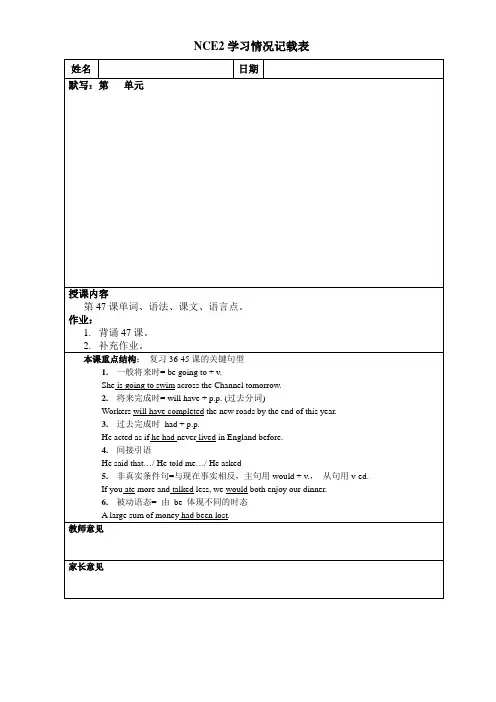
NCE2学习情况记载表练习一、从下面所给词汇中选择适当的词填在横线上。
Before, even though, for, since, because, when, while, though1.Why didn’t you come? —_________ my father wouldn’t let me.2.He didn’t hear the knock at the door ________ he was listening to the radio.3.________ he is rich, he is not very happy.4.________ he said so, you need not believe him.5.Think again _________ you do something.二、单项选择1. —Can I try on this pair of shoes?—Sorry, these shoes are not _______ sale.A. onB. forC. inD. at2. I was late for work ________ there was a traffic accident.A. sinceB. because ofC. due toD. because3. He said he heard someone _______ loudly in the next room.A. singsB. sangC. singingD. to sing4. —When _______ this kind of computer __________ ? —Last year.A. did; useB. was; usedC. is; usedD. are; used5. _______ the water _________ when you are brushing your teeth. Don’t let it waste.A. Turn; onB. Turn; offC. Turn; awayD. Turn; out6. The streets are all wet. It ___________ during the night.A. can’t have rainedB. couldn’t rainC. must have rainedD. needn’t rain7. He suggested _______ a visit to the museum the next day.A. payingB. to payC. payD. being paid8. I shall have to ______ these unpleasant working conditions.A. receiveB. realizeC. recognizeD. accept9. _______ I was in trouble, I always believed that things would change.A. As ifB. EvenC. In spite ofD. Even if10. They had ________ furniture for the small apartment.A. too muchB. much tooC. too manyD. many too二、把下列句子翻译成英语。
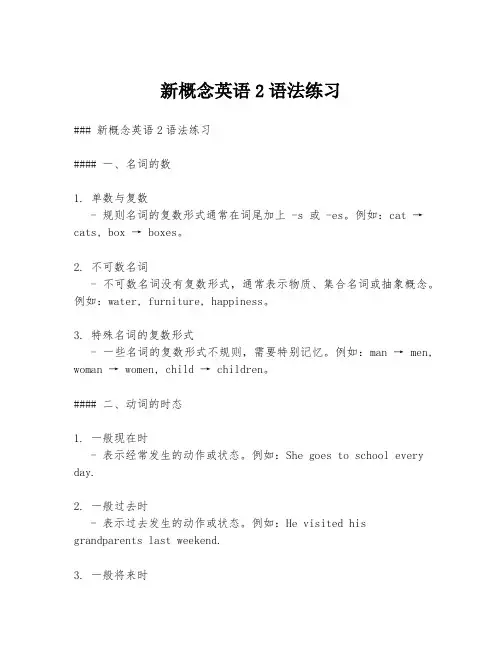
新概念英语2语法练习### 新概念英语2语法练习#### 一、名词的数1. 单数与复数- 规则名词的复数形式通常在词尾加上 -s 或 -es。
例如:cat → cats, box → boxes。
2. 不可数名词- 不可数名词没有复数形式,通常表示物质、集合名词或抽象概念。
例如:water, furniture, happiness。
3. 特殊名词的复数形式- 一些名词的复数形式不规则,需要特别记忆。
例如:man → men, woman → women, child → children。
#### 二、动词的时态1. 一般现在时- 表示经常发生的动作或状态。
例如:She goes to school every day.2. 一般过去时- 表示过去发生的动作或状态。
例如:He visited his grandparents last weekend.3. 一般将来时- 表示将来发生的动作或状态。
例如:They will go to the cinema tonight.#### 三、冠词的使用1. 不定冠词- 用于表示数量上的“一”。
例如:A cat is sitting on the mat.2. 定冠词- 用于特指某物。
例如:The book on the table is mine.3. 零冠词- 在某些固定短语或专有名词前不使用冠词。
例如:Go to school, United States.#### 四、形容词和副词的比较级和最高级1. 规则变化- 一般形容词和副词的比较级在词尾加 -er,最高级加 -est。
例如:bigger, biggest。
2. 不规则变化- 一些形容词和副词的比较级和最高级形式不规则。
例如:good→ better → best。
3. 比较级和最高级的用法- 比较级用于比较两者,最高级用于三者或三者以上。
例如:Sheis taller than me. He is the tallest in the class.#### 五、介词的用法1. 时间介词- 表示时间的介词,如 at, in, on。

青少版新概念2A Uint9-10时态练习1. 现在进行时:be(am, are, is)+ doing肯定句:be + doing否定句:be not + doing疑问句:Be + 主语+ doing?(listen look, now it's ...)1. 直接加ing2. 双写加ing3. 去e加ing2. 一般将来时:1.be going to + do2. will + do肯定句:will/be going to + do否定句:will not/be not going to + do疑问句:Will + 主语+ do?Be + 主语+ going to do?tomorrow next... this afternoon the day after tomorrow soon一般将来时注意的问题:1. be going to 表示打算,不那么确定,而will是确定的2. will 和be going to 不要混合起来用,不会出现will be going to, be will going t o, will going to 的3. will 没有人称变化,而be going to 有人称变化3. 一般现在时:肯定句:主语+do,主语第三人称单数+ does否定句:主语+don't+do主语第三人称单数+doesn't+do疑问句:Do+主语+do?Does+主语第三人称单数+do?usually, sometimes, often, seldom, never, every day1.直接加s,es,2. 某些y-i加s,es( ) 1. There __________ a meeting tomorrow afternoon.A. will be going toB. will going to beC. is going to beD. will go to be( ) 2. Charlie ________ here next month.A. isn’t workingB. doesn’t workingC. isn’t going to workingD. won’t work( ) 3. He ________ very busy this week, he ________ free next week.A. will be; isB. is; isC. will be; will beD. is; will be( ) 4. There ________ a dolphin show in the zoo tomorrow evening.A. wasB. is going to haveC. will haveD. is going to be( ) 5. –________ you ________ free tomorrow?– No. I ________ free the day after tomorrow.A. Are; going to; willB. Are; going to be; willC. Are; going to; will beD. Are; going to be; will be1. He often (have) dinner at home.2. Daniel and Tommy (be) in Class One.3. We (not watch) TV on Monday.4. Nick (not go) to the zoo on Sunday.5. they (like) the World Cup?1、I _______________________( look for) a shirt, I’m looking for a tie.2、They ______________________( plant) flowers in the yard now.3、Miss Baker _________________( drink) milk in the cafeteria now.4、What are you _________(do) now? I ___________(eat) bread.5、It’s nine o’clock. My father_______________(work) in the office.。
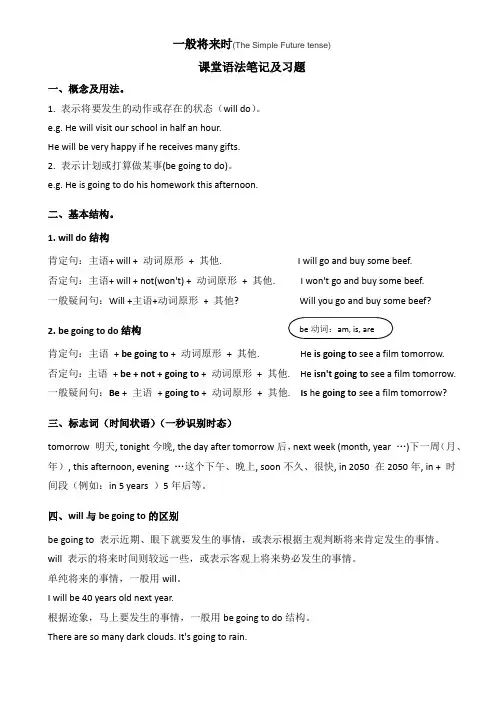
一般将来时(The Simple Future tense)课堂语法笔记及习题一、概念及用法。
1. 表示将要发生的动作或存在的状态(will do)。
e.g. He will visit our school in half an hour.He will be very happy if he receives many gifts.2. 表示计划或打算做某事(be going to do)。
e.g. He is going to do his homework this afternoon.二、基本结构。
1. will do结构肯定句:主语+ will + 动词原形+ 其他. I will go and buy some beef.否定句:主语+ will + not(won't) + 动词原形+ 其他. I won't go and buy some beef.一般疑问句:Will +主语+动词原形+ 其他? Will you go and buy some beef?2. be going to do结构肯定句:主语+ be going to + 动词原形+ 其他. He is going to see a film tomorrow.否定句:主语+ be + not + going to + 动词原形+ 其他. He isn't going to see a film tomorrow. 一般疑问句:Be + 主语+ going to + 动词原形+ 其他. Is he going to see a film tomorrow? 三、标志词(时间状语)(一秒识别时态)tomorrow 明天, tonight今晚, the day after tomorrow后,next week (month, year …)下一周(月、年), this afternoon, evening …这个下午、晚上, soon不久、很快, in 2050 在2050年, in + 时间段(例如:in 5 years )5年后等。

一般将来时专题训练及答案初中英语介绍初中英语中,一般将来时是一个重要的语法时态。
它用于表达将来发生的动作、事件或情况。
掌握一般将来时对于学生的英语口语和写作能力的提高非常重要。
本文将提供一些针对初中英语学生的一般将来时专题训练题目及答案,以帮助学生更好地掌握这一时态。
训练题目1. 选择合适的动词形式填空1.The train ____ (arrive) at 8 o’clock tomorrow morning.2.She ____ (visit) her grandparents next week.3.We ____ (have) a party next Saturday.4.They ____ (go) camping next month.5.I ____ (see) the doctor later today.答案:1.will arrive2.will visit3.will have4.will go5.will see2. 选择正确的词填空1.He ____ (come / comes) to the party tonight.2.They ____ (does / do) their homework tomorrow.3.She ____ (go / goes) swimming next weekend.4.We ____ (will / are) go shopping later.答案:es2.do3.will go4.will3. 根据句意,完成句子1.I ____ (watch) a movie with my friends tomorrow.2.They ____ (not play) football next weekend.3.She ____ (have) a birthday party next month.4.We ____ (not go) to the park this afternoon.5.____ you ____ (come) to the concert next week?答案:1.will watch2.will not play3.will have4.will not go5.Will, come4. 根据图片描述将来的计划请根据图片描述,写出人物的计划。
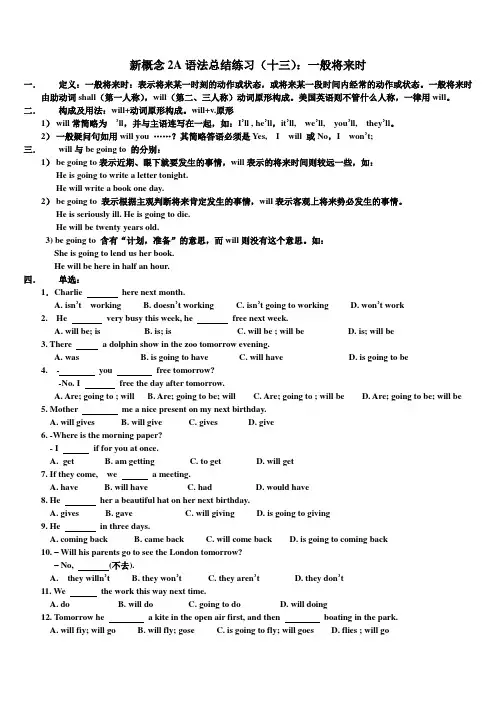
新概念2A语法总结练习(十三):一般将来时一.定义:一般将来时:表示将来某一时刻的动作或状态,或将来某一段时间内经常的动作或状态。
一般将来时由助动词shall(第一人称),will(第二、三人称)动词原形构成。
美国英语则不管什么人称,一律用will。
二.构成及用法:will+动词原形构成。
will+v.原形1)will常简略为’ll,并与主语连写在一起,如:I’ll , he’ll,it’ll, we’ll, you’ll, they’ll。
2)一般疑问句如用will you ……?其简略答语必须是Yes, I will 或No,I won’t;三.will与be going to 的分别:1)be going to表示近期、眼下就要发生的事情,will表示的将来时间则较远一些,如:He is going to write a letter tonight.He will write a book one day.2)be going to 表示根据主观判断将来肯定发生的事情,will表示客观上将来势必发生的事情。
He is seriously ill. He is going to die.He will be twenty years old.3) be going to 含有“计划,准备”的意思,而will则没有这个意思。
如:She is going to lend us her book.He will be here in half an hour.四.单选:1.Charlie here next month.A. isn’t workingB. doesn’t workingC. isn’t going to workingD. won’t work2. He very busy this week, he free next week.A. will be; isB. is; isC. will be ; will beD. is; will be3. There a dolphin show in the zoo tomorrow evening.A. wasB. is going to haveC. will haveD. is going to be4. - you free tomorrow?-No. I free the day after tomorrow.A. Are; going to ; willB. Are; going to be; willC. Are; going to ; will beD. Are; going to be; will be5. Mother me a nice present on my next birthday.A. will givesB. will giveC. givesD. give6. -Where is the morning paper?- I if for you at once.A.getB. am gettingC. to getD. will get7. If they come, we a meeting.A. haveB. will haveC. hadD. would have8. He her a beautiful hat on her next birthday.A. givesB. gaveC. will givingD. is going to giving9. He in three days.A. coming backB. came backC. will come backD. is going to coming back10. – Will his parents go to see the London tomorrow?– No, (不去).A.they willn’tB. they won’tC. they aren’tD. they don’t11. We the work this way next time.A. doB. will doC. going to doD. will doing12. Tomorrow he a kite in the open air first, and then boating in the park.A. will fiy; will goB. will fly; goseC. is going to fly; will goesD. flies ; will go。
新概念2A语法总结练习(五):现在进行时The Present Continuous Tense一般现在时The Present Simple Tense一般将来时The Future Simple Tense 总结练习一.写出下列各句动词的第三人称单数形式:1.They drink a lot of tea. He drinks .2. I often go to school at 7 o’clock. She .3. I often pass you some paper. Lucy .4. I draw some pictures at home. Susan .5. I love candy. My sister .6. They like to play football. My friend .7. We want some water. The cat .8. They read some books. That child .二、写出下列动词-ing形式:ask meet teach sitkick look listen eatput give see washtry take shut hold三、用所给动词的正确形式填空:1.Tim (go)to work every morning . He (work) very hard. 2.you often (water) these flowers?3.The dog (swim) across the lake.4.The students (read) English in the classroom now.5. “What are you doing here?”“I (wait) for Tom.”6. Whatn are you going to (do) tomorrow?7. He (be) not going to play football.8. I’m (study) English tomorrow.9. Be quite! The baby (sleep) in the bedroom now.10. Listen,she (sing) under that tree.四、下列各题中均有一处错误,请指出并订正:1.The dog are jumping into the water.2. Sandy and Sure is standing in front of the door.3. What are he doing?4. Look! The boys are runing in the park.5. I usually goes to school at 7 o’clock in the morning.6. He drink milk every evening.7. Mother and father usually watches TV every night.8. They often eating cakes every morning.9. What does he usually does?10. She never help her mother.五、单项选择:1.you have a book? A.Do B. Are C.Is D.Have2. They on a farm. A.working B.is work C.work D.is works3. She doesn’t her homework in the afternoon.A.doingB.to doC.doesD.do4. Mr. Yang English this year.A.teaches ourB. teaches usC.teaches usD.teach our5. Look!The children their mother do the housework.A.are wantingB.helpC.are helpingD.are looking6. are the birds doing?They are singing in a tree.A.WhoB.WhatC.HowD.Where7. They are their clothes.A.makingB.puttingC.put awayD.putting on8. The children football.A.is playingB.are playingC.play theD.play a9. Mother me a nice present on my next birthday.A.is going to giveB.is go to giveC.going to giveD.gives10. What are you to do tomorrow?A.goB.goingC.wentD.goes六.按照要求改写句子1.He’s playing football with his friends.(变否定句)2.Are you doing your homework? (作肯定回答)3.She is coming out of that shop.(变一般疑问句)4.The dog is eating some bones.(对划线部分提问)5.Linda is going to see a film tomorrow.(变一般疑问句并且做否定回答)6.Paul likes playing football with his friends.(变否定句)7.Claire likes taking photos.(变一般疑问句并且做肯定回答)8.Robert usually goes to school by bike in the morning.(变一般疑问句) 9.William and Karen often watch TV at 9 o’clock at night. (对划线部分提问)七.翻译:1.你经常在学校打篮球吗?是的。
新概念英语第二册语法解析及练习题为了便利同学们学习,今日我给大家带来新概念英语其次册语法解析及练习题,期望可以帮忙到大家,下面我就和大家共享,来观赏一下吧。
新概念英语其次册语法解析及练习题:过去将来进行时过去将来进行时:should / would be + 现在分词表示从过去某时看将来某时正在进行的动作。
. He asked me what I should be doing when he came the next day.练习:1. Tomorrow, I ________ the book all morning.A. am readingB. will be readingC. will readD. have read2. -Can you attend the meeting tonight? -No, ________ the manager aboutsomething urgent.A. I seeB. Ill have seenC. Ill be seeingD. I can see3. Of the millions who saw Haleys comet in 1986, how many people ________long enough to see it return in the twenty-first century?A. will they liveB. they will be livingC. will liveD. living4. He told us that he ________ visiting Japan by this time next year.A. will beB. would beC. wasD. is5. It ________ when you wake up tomorrow morning.A. is snowingB. will snowC. will be snowingD. snows答案:1. B2. C3. C4. B5. C新概念英语其次册语法解析及练习题:过去完成进行时过去完成进行时:had been + 现在分词表示过去某个时间之前始终在进行的动作。
【初中英语】一般将来时复习巩固专讲专练(章末复习+综合测评+答案)一、初中英语一般将来时1.There ___________ a meeting tomorrow afternoon.A. will be going toB. will going to beC. is going to beD. will go to be【答案】 C【解析】【分析】句意:明天下午将有一次会议。
根据时间状语tomorrow afternoon 可知这里应该是there be结构的将来时:there will be或there is going to be,根据句意,故答案为C。
【点评】考查be going to表示按计划,安排将要发生的事。
注意掌握一般将来时的构成,意义和用法。
2.—Do you know when Mrs. White for dinner this evening?—No, but I think she when she is free.A. will come; will comeB. will come; comesC. comes; will come【答案】 A【解析】【分析】句意:——你知道怀特太太今晚是否来吃晚饭吗?——不知道。
但我认为如果她有空,她会来。
空一,句子为含有宾语从句的主从复合句,主句是一般现在时,从句用它所需要的任何时态,根据this evening今晚,可知句子为一般将来时,will come;空二,回答是when引导的时间状语从句,从句是一般现在时,主句应用将来时,will come,故选A。
【点评】此题考查从句的时态。
3.Michael _________ in a school in Yunnan from February to June next year.A. teachB. taughtC. will teachD. was teaching【答案】C【解析】【分析】句意:Michael将会在明年2月到6月在云南的学校教学。
新概念英语二:一般将来时巩固练习will和be going to的用法区别:will常表示带意愿色彩的将来,或者询问对方是否愿意或者表示客气的邀请或命令,还表示客观的将来。
be going to常用于口语中,主要用来表示说话人的打算,计划要发生的事,还可以表示根据某些迹象判断可能或将要发生某事。
试比较:Look at the black clouds. It’s going to rain. 看那些乌云,要下雨了。
I will be twenty-two years old next year. 明年我就22岁了。
一、单项选择。
( ) 1. The day after tomorrow Jay ________ a volleyball match.A. will watchingB. watchesC. is watchingD. is going to watch( ) 2. There ________ a birthday party this Sunday.A. shall beB. will beC. shall going to beD. will going to be( ) 3. They ________ an English evening next Sunday.A. are havingB. are going to haveC. will havingD. is going to have( ) 4. ________ you ________ free next Sunday?A. Will; areB. Will; beC. Do; beD. Are; be( ) 5. He ________ there at ten tomorrow morning.A. willB. isC. will beD. be( ) 6. ________ your sisters ________ your uncle the day after tomorrow?A. Are; going to visitsB. Is; going to visitC. Will; borrowsD. Are; going to visit二、用括号内所给词的适当形式填空。
新概念英语第二册第12课包含课文练习Lesson 12Goodbye and good luc再见,一路顺First listen and then answer the question.听录音,然后回答以下问题Where is Captain Alison going and howOur neighbour, Captain Charles Alison, will sail from Portsmouth tomorrow. We'll meet him at the harbour early in the morning. He will be in his small boat, Topsail. Topsail is a famous little boat. It has sailed across the Atlantic many times.Captain Alison will set out at eight o'clock, so we'll have plenty of time. We'll see his boat and thenwe'll say goodbye tohim. He will be away for two months. We are very proud of him. He will take part in an important race across the Atlantic.New words and expressions生词和短luckn.运气,幸proudadj.自importantn.船adj.重要captain航sailv.harbourn.港课文详Further notes on the tex我们的邻居查尔Our neighbour, Captain Charles Alison, will sailfrom Portsmouth tomorrow.艾利森船长明天就要从朴次茅斯启航了)这个句子以及本课的大部分句子用的是一般将来时cf.本课语法句子的主语部our neighbourCaptain Charles Aliso为同位语cf.课语法下He will bein his small boat,T opsail中Topsail也为同位语明天一大早我们将在码头为他送行We'll meet him at theharbour earlyin the morning.在表示时间的短in the morning, in the afternoo等前面可以再加early, lat等副词,以便更确切地表时间Tony will arrive late in the afternoon.托尼下午晚些时候才能抵达“涛波赛”号是艘有名的小艇Topsail is a famous little boat littl 除了表示形体上小的意义之外,还含有“可爱”的意思,是个带有感情色彩的词。
新概念英语第⼆册Lesson_2_练习题新概念英语⼆册Lesson 2 练习⼀、本课重点★⼀般现在时与⼀般将来时:⼀般现在时的基本⽤法:1、表⽰现存的状态、情况。
I am a teacher now .2、表⽰过去、现在和将来都理应存在的客观事实或真理。
The sun runs round the the earth.3、表⽰现阶段经常性、反复性的活动。
He is always ready to helpothers .现在进⾏时的基本⽤法:1、表⽰说话此刻正在进⾏。
I am studying , please be quiet.2、表⽰现阶段正在持续的动作。
These days I am translating a book.3、表⽰最近的将来已定的安排。
I am leaving for the USA in threedays .4、现在进⾏时常与always , forever 等词连⽤,表⽰抱怨、厌烦等不愉快的事He is always talking and talking .★What 和how 引导的感叹句。
What + 名词+ 主谓 What a lovely boy he is !How + 形容词+ 主谓 How fast he runs !⼆、本课重点词组Not --- until 直到---才--- get up early 早起on Sundays 每个星期天 stay in bed 呆在床上look out of 向---外⾯看 just then 正在这时arrive at/in 到达(⼩地⽅)/(⼤地⽅) =get to = reach三、选择1、He broke his arm playing basketball yesterday and was sent to ___.a. a hospitalb. the hospitalc. hospitald. hospital2、We went to the theater to see a ___ last week .a. gameb. show3、I ____ in the back of the classroom .a. was satb. sittingc. was seatedd. seated4、 George went to Beijing on ___ last month.a. matterb. businessc. thingsd. leave5、She ran ___ the room when she heard the alarm .a. offb. out ofc. outdoord. out6. I turned to speak to the person standing _____ mea. behindb. backc. in the front ofd. ahead of7. If you __ more attention in class , you may actually learn something .!a. getb. receivec. taked. pay8. He waited ___ she had finished speaking .a. beforeb. afterc. whend. until9. The bus was ten minutes ___.a. lateb. later10. Oh, dear, I forgot the air tickets. You ____ something .a. have left .b. are always leavingc. are leavingd. always left11. listen to the two girls by the window . What language ______?a. did they speakb. were they speakingc. are they speakingd. have they been speaking12. What ____ beautil weather ! Great for ___ holiday.a. a ;ab. the ;thec. the ;ad. /;a13. _____ a nice watch it is !a. Howb. Whatc. What ad. How a14. _____ interesting the film is !a. Whatb. What anc. Howd. How an15. I’ve won a holiday for two days to Canada. I __ my mum .a. am talkingb. have takenc. taked. will have taken四、阅读理解Many people smoke because they think smoking is an enjoyment . In fact , smoking is a bad habit . Firstly , dictors and scientists have found that it’s harmful to health. It may cause some serious diseases , and it’s also harmful to others’ health . Secondl , many big fires have been caused by smokers . They have caused losses of lives and other things . And smokers have to spend a lot of money on cigarettes. So I think it is a bad habit . Give up smoking , please !1. Many people who smoke ____a. like smoking very muchb. don’t know the harm smoking can do to themc. are trying to give up smoking because it is a bad habitd. can make a lot of money every day2. Smoking _______________a. will certainly cause some serious diseasesb. may cause some serious diseasesc. never causes many serious diseasesd. often causes many serious diseases3. What do smokers have to do to buy cigarettes?a. They have to spend little money on cigarettes.b. They have to spend much time on cigarettes.c. They have to spend much money on cigarettes.d. They have to spend little time on cigarettes.4. In the writers opinion(观点), what should smokers do ?a. Smokers should keep on smoking .b. Smokers should enjoy smoking .c. Smokers should be doctors and scientists .d. Smokers should stop smoking .。
新概念英语二:一般将来时巩固练习
will和be going to的用法区别:
will常表示带意愿色彩的将来,或者询问对方是否愿意或者表示客气的邀请或命令,还表示客观的将来。
be going to常用于口语中,主要用来表示说话人的打算,计划要发生的事,还可以表示根据某些迹象判断可能或将要发生某事。
试比较:
Look at the black clouds. It’s going to rain. 看那些乌云,要下雨了。
I will be twenty-two years old next year. 明年我就22岁了。
一、单项选择。
( ) 1. The day after tomorrow Jay ________ a volleyball match.
A. will watching
B. watches
C. is watching
D. is going to watch
( ) 2. There ________ a birthday party this Sunday.
A. shall be
B. will be
C. shall going to be
D. will going to be
( ) 3. They ________ an English evening next Sunday.
A. are having
B. are going to have
C. will having
D. is going to have
( ) 4. ________ you ________ free next Sunday?
A. Will; are
B. Will; be
C. Do; be
D. Are; be
( ) 5. He ________ there at ten tomorrow morning.
A. will
B. is
C. will be
D. be
( ) 6. ________ your sisters ________ your uncle the day after tomorrow?
A. Are; going to visits
B. Is; going to visit
C. Will; borrows
D. Are; going to visit
二、用括号内所给词的适当形式填空。
1. My mother _will get__(get) angry when she sees my dirty shoes in the sitting
room.
2. What do you think Sally __will be__(be) in five years?
3. What __will__they __do__(do) if it doesn’t rain?
4. ---Don’t forge t to write to me.
--- I ___will write____(write) to you as soon as I arrive in Paris.
5. We will plant more trees in the city, so there ___will be___(be) less pollution here.
6. Hurry up, or you ___will be___(be) late for the meeting.
7. I think they __will enjoy____(enjoy) their trip to Europe next week.
8. Sue __will help__(help) me with my English if she’s free tonight.
9. I am afraid there __will be__(be)a meeting this afternoon. I can’t join you.
10. Mike _won’t believe_(believe, not)this until he __sees__(see)it with his own eyes. 三.根据汉语提示,完成下列句子。
1.我明天下午要帮助山姆学中文。
I ___________________ Sam ______________his Chinese tomorrow afternoon.
2. 如果你每天都吃汉堡的话,你会发胖的。
If you ___________hamburgers every day, you _______________________.
3.学生们从现在起将会努力学习。
The students ________________hard from now on .
4. 下星期五将有一场足球比赛。
There ____________ a football match _____________________.
5. 你认为我们两小时以后能完成吗!
Do you think that _____________________ in two hours? .
6. 如果我下星期六有空,我就和妹妹一起去看电影。
I _____________________ with my sister if I’m free next Saturday.
7. 他们明天要去坐船去伦敦吗?
_______ they ___________go to London by ship tomorrow?
8. 我打算这个暑假去游长城。
I _______________________ the Great Wall this summer holiday.
9. 下周一下午我们要去电影院看电影。
We ______________ in the cinema _____________________afternoon.
10. 明年这个村子里将有一所新学校。
There _______________________ in the village next year.
The keys:
一、单项选择。
1. D
2. B
3. B
4. B
5.C
6. B
二、动词填空。
1.will get
2.will go
3.will be
4.will, do
11. will be 12. won’t believe ; sees 13. will win。